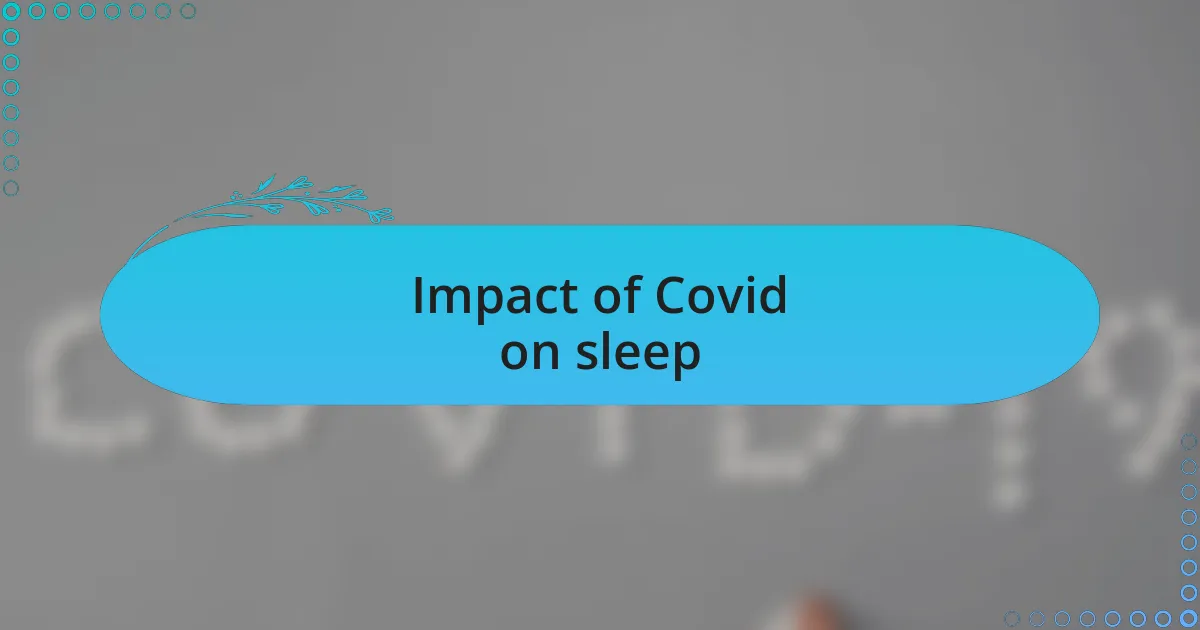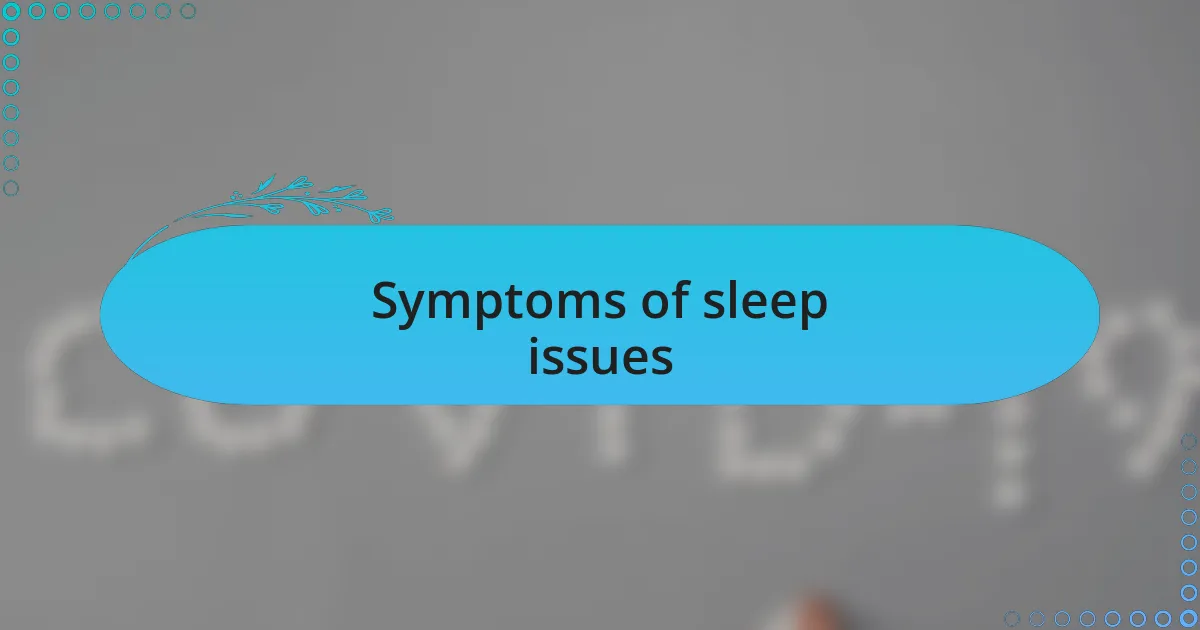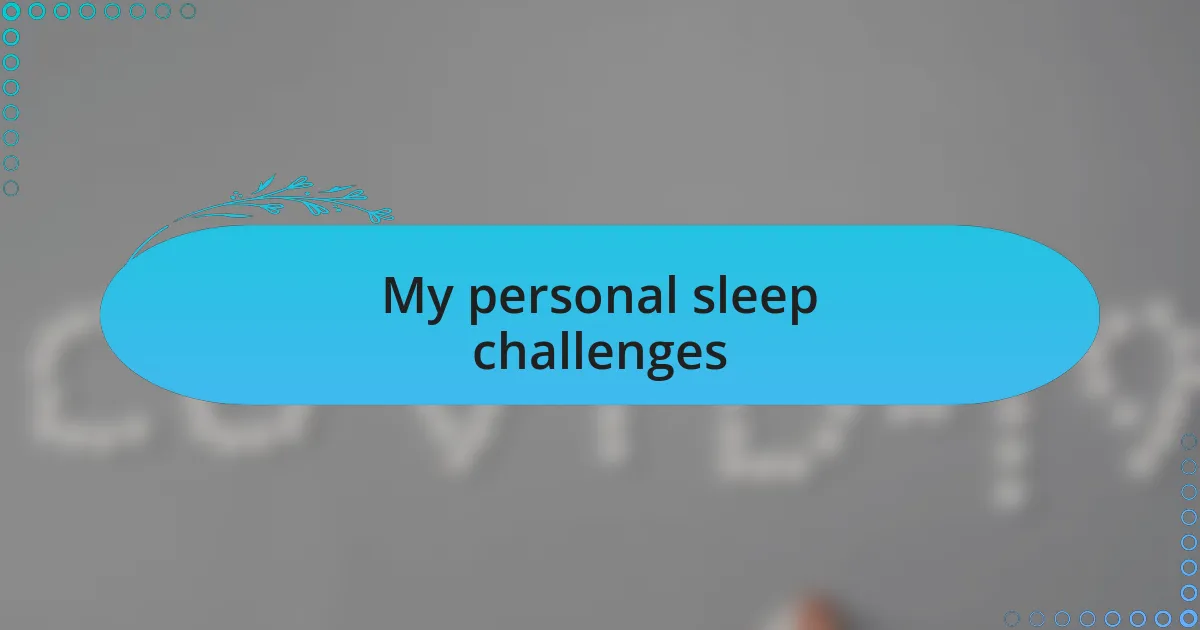Key takeaways:
- Sleep health significantly affects emotional well-being and overall physical health, with both sleep quality and cycles playing crucial roles.
- The COVID-19 pandemic led to widespread sleep disturbances, increasing insomnia and anxiety as daily routines were disrupted.
- Personal strategies for improving sleep quality included establishing a calming bedtime routine, creating a restful sleep environment, and practicing mindfulness techniques.
- Consistency in sleep routines and ongoing adjustments to sleep environments can greatly enhance overall restfulness and quality of sleep.

Understanding sleep health
Sleep health is incredibly vital, yet it often gets overlooked in our fast-paced lives. I remember a time when I assumed that burning the midnight oil was a badge of honor. How many of us fall into that trap, believing that sacrificing sleep is worth it for productivity? The reality is that lack of sleep can undermine not just our daytime alertness but also our emotional well-being.
When I started to delve deeper into sleep health, I uncovered its profound impact on everything from mood to immune function. I often found myself irritable and unfocused, but it took me a while to connect those feelings back to my inconsistent sleep schedule. It’s fascinating to think that the quality of our rest can completely alter our outlook and physical health. Have you ever woken up feeling more tired than when you went to bed? That’s a clear sign that something isn’t right.
Understanding how sleep cycles work is just as crucial as the amount of sleep we get. I used to think that snoozing for eight hours was enough, but learning about the different stages of sleep opened my eyes. Each stage, from light sleep to REM, plays a unique role in our physical restoration and mental clarity. Isn’t it interesting how something as simple as being aware of our sleep patterns can lead to better health outcomes?

Impact of Covid on sleep
The pandemic has profoundly altered our sleep patterns, as I discovered firsthand. Initially, I noticed that the stress of uncertainty made it hard to wind down at night, leaving me tossing and turning for hours. It was almost surreal how the anxiety about everyday life could manifest in sleepless nights – have you felt that same struggle?
As more people worked from home, I realized that the lines between work and rest blurred even further. I often found myself checking emails right before bed, which only further complicated my ability to relax. It’s strange how the comfort of home can sometimes lead to increased stress, almost like it’s too easy to stay connected, and I can’t help but wonder if this is a shared experience.
Lastly, I’ve read that disrupted routines during COVID-19 caused many to struggle with sleep-related issues like insomnia and restless nights, a fact that resonates deeply with others I spoke to. I vividly remember conversations with friends who experienced similar challenges, revealing that they, too, faced an unexpected battle with sleep. Isn’t it remarkable how a global crisis can ripple through our intimate, daily rituals?

Symptoms of sleep issues
Experiencing sleep issues can often come with a range of telling symptoms. For me, one of the most noticeable signs was persistent fatigue during the day. I remember sitting at my desk, slouched over, struggling to stay awake during meetings. Have you ever felt that heavy weight in your eyelids, like a fog that just won’t lift? It’s exhausting.
Another symptom I faced was the constant racing of my mind when I tried to sleep. Some nights, as I lay in bed, I would replay the day’s events or worry about what tomorrow would bring. These swirling thoughts kept me awake, often leading to feelings of frustration and helplessness. Has your mind ever felt like a runaway train, making restful sleep feel like an impossible dream?
Physical symptoms also emerged as my sleep issues progressed. I started noticing tension in my shoulders and a tightness in my chest, as if my body was responding to the stress I couldn’t seem to escape. I learned the hard way how important it was to pay attention to these signals, as they were my body’s way of calling out for help. Have you ever ignored such signs, only to find that they worsened over time?

Research on sleep and Covid
Research on sleep and Covid has revealed a compelling connection between the pandemic and disrupted sleep patterns. I recall diving into studies that illustrated how the stress and uncertainty of Covid led to increased insomnia and anxiety for many individuals, including myself. Have you ever found that your sleep was far from restful during those early lockdown days, with anxiety creeping in at night?
One particularly striking piece of research noted that over 30% of people reported worsening sleep quality during the pandemic. I can relate to that statistic, as I often found myself waking up multiple times throughout the night, my mind racing with worries about health and safety. It’s fascinating to think about how collectively experiencing a global crisis can manifest in such personal ways; have you experienced a similar shift in your sleep patterns?
Furthermore, studies have indicated that the isolation resulting from social distancing measures contributed significantly to sleep disturbances. I remember feeling the weight of loneliness echoing in my mind as I tried to rest, making it difficult to find that peaceful state necessary for sleep. It’s curious—how many of us found solace in our dreams, only to wake up feeling just as troubled?

My personal sleep challenges
I’ve faced my own set of sleep challenges, especially during the height of the pandemic. I remember those nights when my mind would replay the day’s anxieties, making it nearly impossible to settle down. Who could have imagined that a simple act like sleeping would transform into a nightly battle during such uncertain times?
On some evenings, the hours felt like they stretched endlessly, staring at the ceiling while my thoughts spiraled into a web of “what ifs.” As someone who typically cherished a solid night’s sleep, grappling with insomnia was a new and unwelcome chapter in my life. It made me wonder—how many of us found ourselves in this frustrating predicament?
Sometimes, just when I thought I could finally drift off, I’d hear the neighbors conversing or an ambulance siren wailing in the distance. Those external reminders of a chaotic world just outside my window served as unwelcome guests during my sleepless hours, amplifying feelings of unease. Have you ever felt that struggle, where the outside world echoes into your most vulnerable moments?

Strategies I implemented
To regain some control over my sleep, I started a nightly routine that transformed my pre-bedtime hours. I found that reading a relaxing book or journaling about my day helped to quiet my racing thoughts. Have you ever noticed how immersing yourself in a different world can ease your worries? I often did.
Another strategy I embraced was creating a calming sleep environment. I dimmed the lights, played gentle music, and even invested in blackout curtains to shut out any lingering distractions. The first time I woke up feeling refreshed, I realized that sometimes the physical space we inhabit can greatly influence our mental state.
Mindfulness became a game changer for me. I dedicated a few minutes each night to deep breathing and meditation. This practice not only calmed my mind but also allowed me to acknowledge the day’s stresses without letting them dictate my sleep. Have you tried mindfulness techniques? I discovered that instead of pushing away my thoughts, embracing them helped me find peace.

Results and ongoing practices
Since embracing these strategies, I’ve experienced significant improvements in my sleep quality. I vividly remember the first night I followed my new routine; it felt almost magical to drift off without tossing and turning. Now, I usually enjoy longer periods of restful sleep, and the groggy mornings have become a thing of the past.
My journey hasn’t been without its challenges, though. There are still evenings when my mind races, despite all my efforts. What has helped during those tougher nights is consistency; I stick to my routine as best as I can, even when it feels difficult. Keeping that predictability in my schedule seems to signal to my body that it’s time to unwind, much like how the sun setting can cue the night.
I also continue to refine my sleep environment, exploring new calming techniques. I recently added an essential oil diffuser with lavender — it’s incredible how such a small change can create a soothing atmosphere. I’m curious to hear if others have made similar adjustments. Have you found scents or sounds that enhance your sleep experience? These ongoing practices are not just rituals; they’ve become my anchor in navigating sleep challenges.